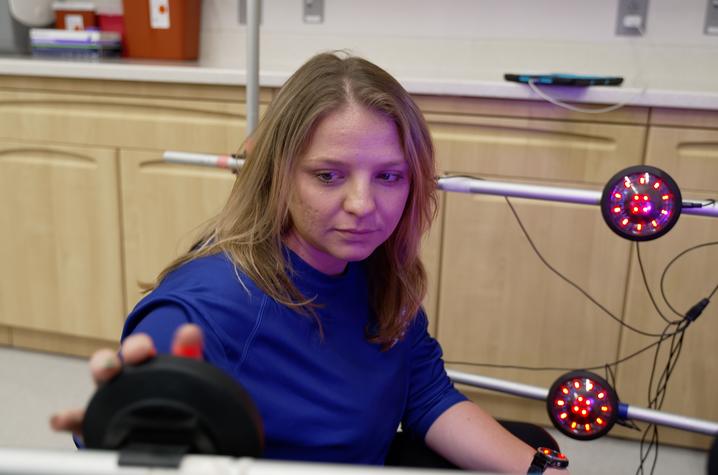‘I am a UK Innovator’: College of Health Sciences’ Michaela Keener
Video produced by UK Research Communications. To view captions for this video, push play and click on the CC icon in the bottom right-hand corner of the screen. If using a mobile device, click on the “thought bubble” in the same area.
LEXINGTON, Ky. (Oct. 30, 2024) — Innovation is a new way of thinking that can often lead to transformative breakthroughs. Research Communications partnered with UK Innovate to spotlight faculty innovators with pioneering ideas at the University of Kentucky. UK Innovate works collaboratively with innovators to strategically assess, protect and license early-stage technologies and co-create new technology startups.
In the final Q&A of the series, Michaela Keener, Ph.D., discusses her work in developing an interactive digital health system designed to enhance access to care for equestrians. Keener is an assistant professor of athletic training and clinical nutrition in the UK College of Health Sciences. She has received research funding from the U.S. National Science Foundation, National Institute of Occupational Safety and Health and University of Cincinnati.
UKNow: What inspired you to become a researcher?
Keener: I grew up in the equestrian community and I am passionate about improving the health, wellness and safety of this community. I was fortunate to have supportive professors during my undergraduate studies who encouraged me to participate in an undergraduate research program. That experience sparked my passion for research in this field and set me on the path to pursue it further.
UKNow: How did this research start?
Keener: In 2020, we started working directly with the jockeys at Keeneland, which was a great opportunity. We quickly learned about the preferences and concerns the jockeys had with concussion protocols and wanted to work with the community to create a solution. This led to developing The Graham, an interactive digital health system designed to measure balance and reaction time. We hope for it to be used as a tool to improve access to care for all equestrians.
UKNow: What is the most challenging aspect of your research?
Keener: One of the biggest challenges is trying to break the stereotypes that revolve around different parts of the horse industry. These include stereotypes regarding socioeconomic status and athleticism of the rider.
UKNow: What have been the most fulfilling moments for you regarding your discoveries?
Keener: The most fulfilling moments have come from interacting with the community. Nothing feels better than having equestrians from diverse backgrounds confide in us and tell us they feel heard.
UKNow: How has your research impacted the way you train students?
Keener: We engage with a wide range of individuals, including academics and community members from diverse socioeconomic backgrounds. Therefore, one of our key objectives is to train students in how to effectively communicate and share our work and findings with this broad and varied audience. Developing these communication skills is a central focus in our student training.
UKNow: What drew you to the University of Kentucky?
Keener: Being located in the heart of horse country, UK provides an ideal setting for my research. Over the past five years, I have been continually inspired and impressed by the unwavering support I have received from my mentors, colleagues, administrators, UK Innovate and the community through all my endeavors, regardless of their scale.

As the state’s flagship, land-grant institution, the University of Kentucky exists to advance the Commonwealth. We do that by preparing the next generation of leaders — placing students at the heart of everything we do — and transforming the lives of Kentuckians through education, research and creative work, service and health care. We pride ourselves on being a catalyst for breakthroughs and a force for healing, a place where ingenuity unfolds. It's all made possible by our people — visionaries, disruptors and pioneers — who make up 200 academic programs, a $476.5 million research and development enterprise and a world-class medical center, all on one campus.




